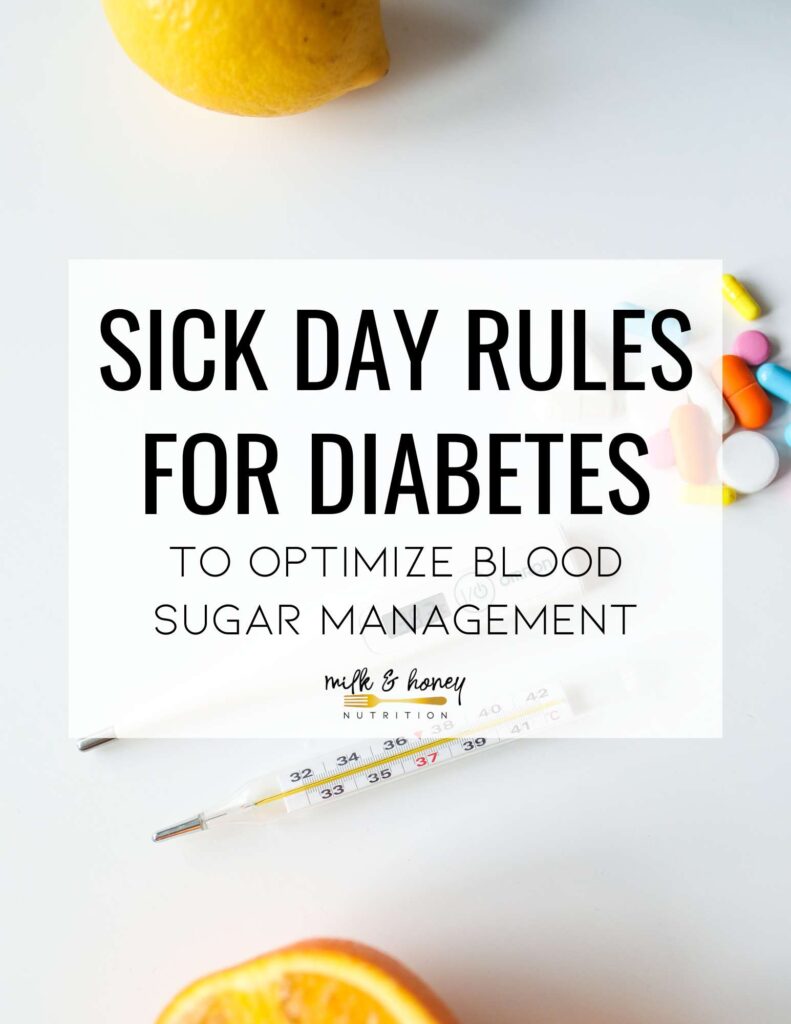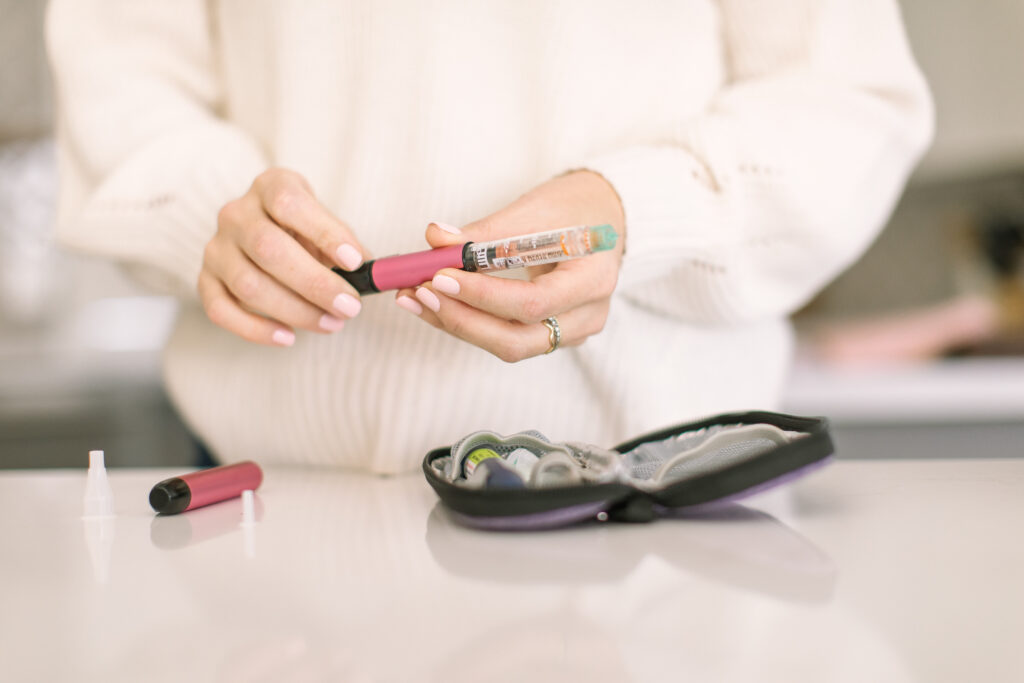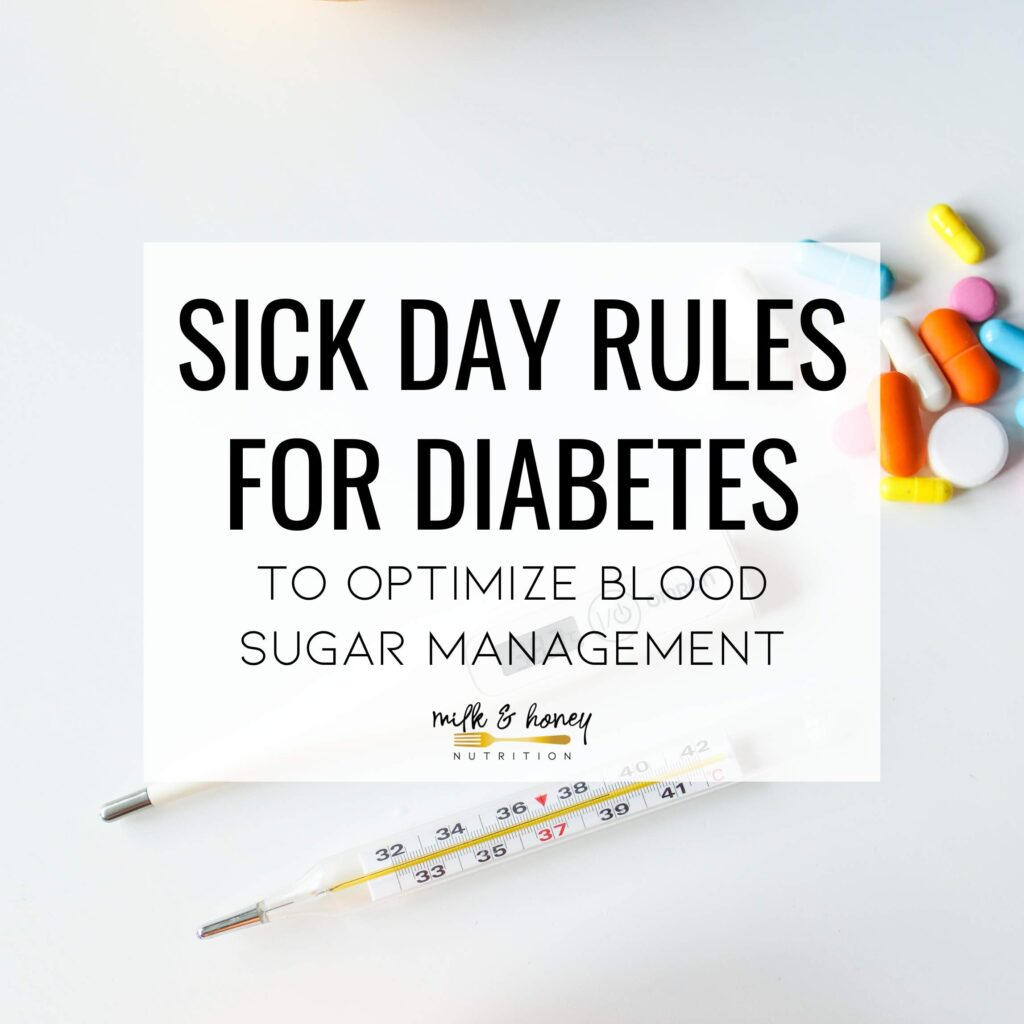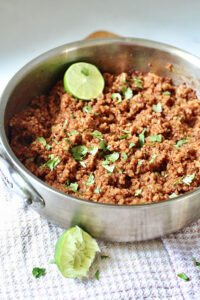
It’s important to have a go-to set of sick day rules for diabetes when you’re sick to help you manage your blood sugars.
Living with diabetes can be difficult at times, especially when you’re not feeling your best or dealing with high blood sugar when sick. In this blog post, we’ll discuss sick day rules for diabetes to help your body heal and maintain stable blood sugars as best as possible.
*This article is not intended to provide medical advice, diagnosis, opinion, treatment or services. This article and the links contained in it provide general information for educational purposes only. The information provided in this article is not a substitute for medical care. Do not use the content in this article in place of the advice of your physician or registered dietitian.*
Does being sick raise blood sugar?
When you’re sick, your blood sugar levels will most likely be impacted. It’s really important to have a plan in place for managing diabetes when you’re sick.
Many people report experiencing elevated blood sugars when sick, though some people also experience lower than normal blood sugars due to lack of appetite.
Sick day management for diabetes
As someone living with type 1 diabetes myself, I find my blood sugars run higher when I’m sick and I have to pay closer attention to them to prevent myself from developing ketones.
It’s also important to remember that out of control blood sugars can weaken your immune system which means your body may not be able to heal as quickly as it should.
Sp, what are the sick day rules for diabetes? Below, I’ll share recommended advice and options for setting up sick day rules for diabetes, as well as some things that have worked well for me personally in living with diabetes for over 30 years.
As always, make sure you chat with your doctor before trying anything new in your diabetes management strategies.

Diabetes sick day rules
The following sick day rules for diabetes are commonly recommended to help your body heal quickly and keep blood sugars as relatively stable as possible.
- Stay hydrated
- Check blood sugars often
- Take medications as directed
- Eat low carb foods you enjoy
- Watch for DKA (diabetic ketoacidosis) warning signs
- Take a break from strenuous physical activity and rest
1. Stay Hydrated
Make sure you’re drinking plenty of sugar free fluids like water, broth, caffeine free tea, sugar free sports drinks (like Gatorade Zero, propel, etc.), or others to prevent yourself from becoming dehydrated. If you’re experiencing sweating, vomiting, diarrhea, and decreased appetite, you will need to consume more fluids than normal. These symptoms increase your risk of becoming dehydrated… which can cause your blood sugars to rise more than normal.
2. Check blood sugars often
Pay closer attention to your blood sugars when you’re not feeling well. Blood sugar levels can change quicker when you’re sick.
If you wear a continuous glucose monitor, talk to your doctor about adjusting your low and high blood sugar alarms to be tighter when you’re sick.
If you use a blood sugar meter and finger sticks, talk to your doctor about how often you should be testing.
3. Take medications as directed
Being sick can affect your appetite. It may be less or it may be more. And, you may be tempted to make adjustments to your medications or insulin on your own. Take your medications as directed and always check with your doctor before changing your dosages.
4. What should people with diabetes eat when they are sick? Eat low carb foods you enjoy
People with diabetes should stick to the same types of foods as other people when they are sick, with some exceptions. We want to focus on easy to digest foods, but these can often be higher carbohydrate foods which may cause your blood sugars to fluctuate even more.
Some of my favorite lower carbohydrate, but easier to digest foods include:
- Low carb crackers
- Low carb toast with peanut butter
- Protein drinks with little or no added sugar
5. Watch for DKA warning signs
DKA stands for diabetic ketoacidosis, and it is a life threatening condition that people with diabetes are at a greater risk for when sick. Dehydration when sick also contributes to this increased risk. This is one reason why we want to manage blood sugar levels closer when sick. Part of your sick day rules for diabetes should include regularly monitoring for symptoms of DKA which include:
- Fruity breath odor
- Excessive thirst
- Frequent urination
- Nausea and vomiting
- Feeling confused or disoriented
- High ketones
Check for ketones every 4-6 hours. If you notice any of these symptoms, contact your doctor immediately.
6. Take a break from strenuous physical activity and rest
We’ve covered above how being sick can cause your blood sugars to run higher or lower than normal and change quicker than normal. We also know that exercise can cause fluctuations in blood sugars. Combining these two things could make your blood sugar is even more difficult to manage. Try to give your body the rest it needs when you’re feeling sick… And if you feel up for physical activity, stick to light to moderate walks while recovering.
Flu and diabetes
If you were living with diabetes and come down with the flu, it’s important to call your diabetes care team and let them know. If you have not already decided on a set of sick day rules, they should provide you with instructions then. The flu can be devastating for someone with diabetes. People with chronic illnesses, including diabetes, are at a much higher risk of hospitalization from the flu… And even death.
Your best defense against contracting the flu is getting vaccinated each year.
I’ve only had the flu once as an adult living with diabetes and it was just plain awful, for lack of a better way to describe it. In addition to feeling poorly for several days, I was also put on Tamiflu which significantly impacted my blood sugars. It did shorten the duration of my flu-like symptoms, however my blood sugars ran extremely high while on it.
I worked with my endocrinologist to come up with a plan to prevent my blood sugars from getting too high during that time. (Please keep in mind this was my personal experience and if you find yourself in a similar situation, you should always check with your doctor before making adjustments to your medications or insulin.)
Diabetes and throwing up or diarrhea
If you have a stomach bug that is causing vomiting or diarrhea, this can be especially concerning for people with diabetes. Vomiting and diarrhea drastically increase your risk for dehydration, which we know is a risk factor for elevated blood sugars and even DKA as we discussed above. It is especially important to stay hydrated and in consistent communication with your diabetes care team.
Fever and diabetes
Similar to a stomach bug that will increase risk for dehydration, a fever can also increase your risk for dehydration… which again, increases your risk of high blood sugars. It is important to stay hydrated with your favorite sugar-free fluids.
I have also found personally, that I have a harder time feeling the symptoms of hypoglycemia (or low blood sugar) when I have a fever. This is another example of the need to pay extra close attention to your blood sugars when you are sick and living with diabetes.
Special considerations for insulin-dependent type 2 diabetes and type 1 diabetes sick day rules
People who are on insulin to manage their diabetes have a significantly increase risk of developing DKA when sick. This includes people with:
- Type 1 diabetes
- Insulin-dependent type 2 diabetes
- Gestational diabetes being treated with insulin
It is crucial for these populations to have an established set of sick day rules for diabetes set up with their diabetes care team in the event they become sick.
Sick day rules for diabetes
Having an established set of sick day rules for diabetes prior to actually becoming sick will greatly increase your chances of recovering quickly from illness while living with diabetes. Speak with your endocrinologist or diabetes care team to decide on the best set of sick day rules for your unique situation.

References
- 10 Surprising Things That Can Spike Your Blood Sugar, CDC, (2022). https://www.cdc.gov/diabetes/library/spotlights/blood-sugar.html
- Planning for Sick Days, American Diabetes Association, (2024). https://diabetes.org/getting-sick-with-diabetes/sick-days
- Diabetes: Managing sick days, CDC, (2022). https://www.cdc.gov/diabetes/living-with/managing-sick-days.html
- Diabetes & DKA (ketoacidosis), American Diabetes Association, (2024). https://diabetes.org/about-diabetes/complications/ketoacidosis-dka/dka-ketoacidosis-ketones
- Type 1 Diabetes And The Flu (And Other Illnesses), Juvenile Diabetes Research Foundation, (2024). https://www.jdrf.org/t1d-resources/living-with-t1d/t1d-and-flu/





